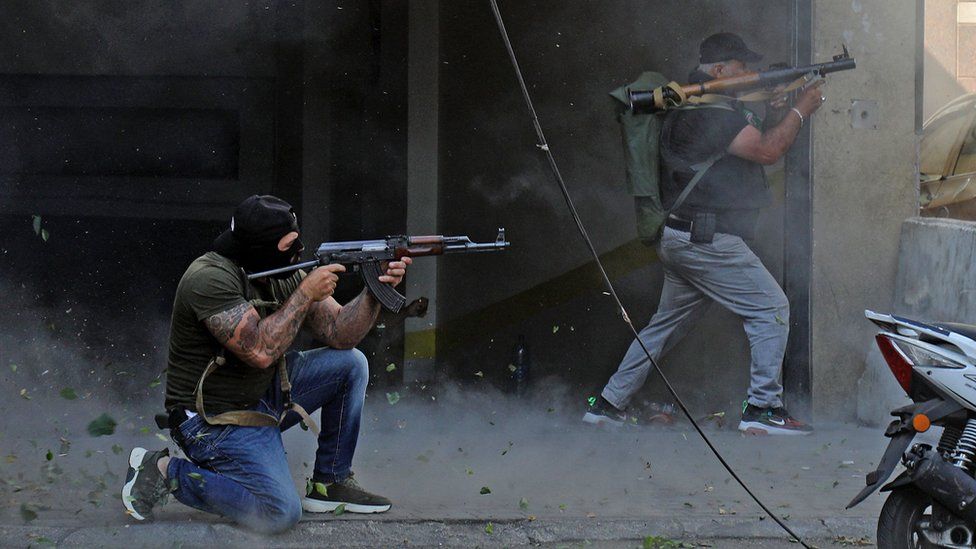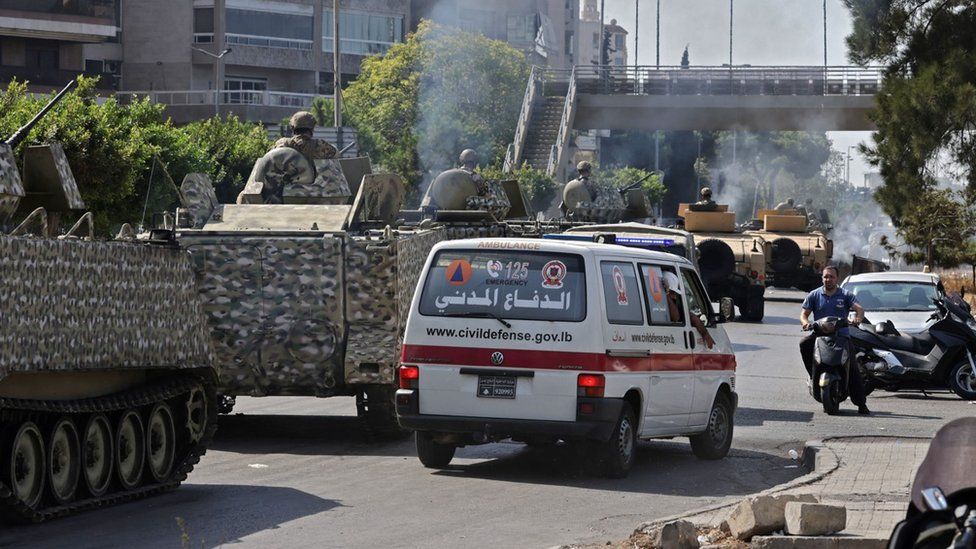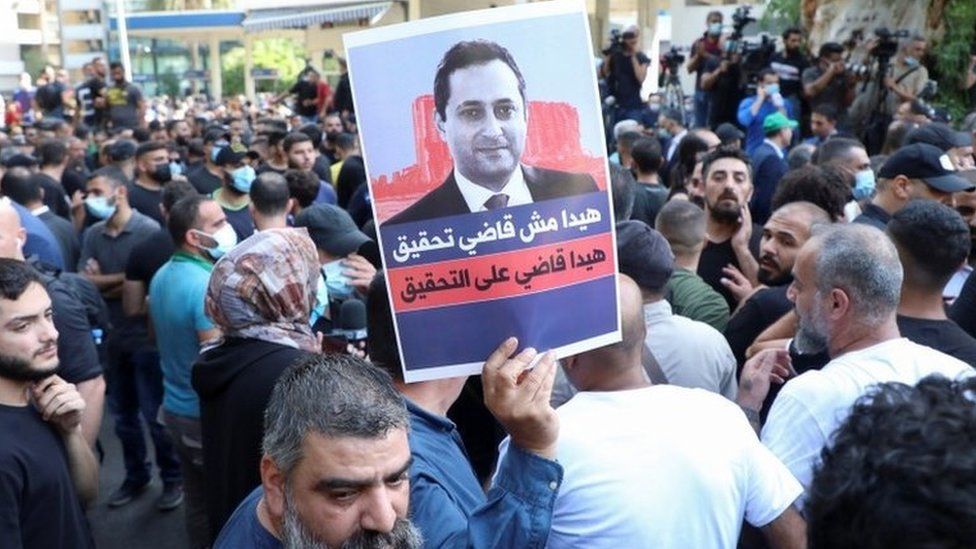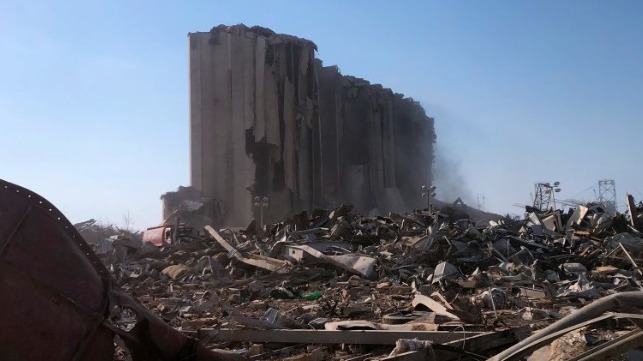Experts say judge leading investigation into last year’s explosion at Beirut’s port rattled the country simply by challenging systemic impunity.

By Kareem Chehayeb
16 Oct 2021
Beirut, Lebanon – When the Lebanese government announced more than a year ago that the probe into the devastating explosion in Beirut’s port would be conducted domestically, few expected that senior officials would be charged.
But even fewer expected that the lead investigator, Judge Tarek Bitar, could rattle the country’s entrenched leadership, which for decades has reigned with impunity and routinely quashed legal investigations that may hold it accountable.
More than 200 people were killed and some 6,500 wounded when hundreds of tonnes of highly explosive ammonium nitrate fertiliser stored in the port for years ignited on August 4, 2020. The explosion wrecked large parts of Beirut and continues to haunt Lebanon, as the country struggles with an economic meltdown that plunged three-quarters of its population into poverty. No officials have been convicted yet.
Bitar’s persistence to pursue senior political and security officials, despite their attempts to delegitimise and remove him, has put the country on notice.
“Judge Bitar is giving the Lebanese hope in the domestic judiciary after many people have totally given up on justice and accountability locally,” Aya Majzoub, Human Rights Watch Lebanon researcher, told Al Jazeera. “He is single-handedly facing off with the entire political establishment that is implicated in the Beirut blast.”
On Thursday, a protest in Beirut by Hezbollah and Amal supporters calling for Bitar’s removal turned into a bloodbath when unidentified snipers fired at the crowd from rooftops, triggering a gun battle that last for more than four hours. Seven civilians and combatants died.
Families of the explosion victims, activists and human rights organisations continue to back Bitar. However, several political and religious leaders from across the country’s sectarian spectrum continue to call for his removal and accuse him of bias, accusations dismissed by legal experts and rights groups.
Bitar was appointed to lead the investigation in February following the dismissal of his predecessor, Judge Fadi Sawan, who had shockingly charged former ministers Ali Hasan Khalil, Ghazi Zeiter, Youssef Finianos, and Lebanon’s then-caretaker Prime Minister Hassan Diab with criminal negligence.
Over the past seven months, Bitar has continued to pursue the same individuals and also charged former minister Nohad Machnouk. He has also repeatedly requested to summon two senior security officials, General Security chief Major-General Abbas Ibrahim and State Security head Major-General Tony Saliba – but the Ministry of Interior and Higher Defence Council would reject the requests.
The charged politicians have declined to show up to the interrogations. They have also continuously tried to remove the judge by filing legal complaints, which have sometimes temporarily suspended the investigation. Though the judiciary has so far dismissed these complaints, legal experts say this has been a tactic to stall the investigation, while major political parties have now also begun calling for Bitar’s removal.
The most vociferous has been Hezbollah, even though Bitar has not charged anyone from the party. Just three days before Thursday’s clashes, Hezbollah leader Sayyed Hassan Nasrallah accused the judge of politically targeting officials and called for an “honest and transparent judge”. Last month, a senior Hezbollah security official reportedly threatened Judge Bitar in his office.
“It’s clear that Bitar has hit too close to home, but we don’t know why Hezbollah, in particular, is leading this campaign against him,” Majzoub said. “They keep saying they’re singled out, but none of the officials Bitar has called for investigation are Hezbollah officials.”
Lebanon’s troubled history is littered with conflict, including a vicious 15-year civil war that ended in 1990, followed by decades of assassinations and sporadic armed clashes. But the perpetrators of even the gravest crimes were never held to account. Many say this is an extension of rampant corruption in Lebanon, where the judiciary is not independent of the government.
Now, political leaders have accused Bitar and the judiciary of being politicised.
Families and experts told Al Jazeera that Bitar set a new precedent in the port explosion investigation and shocked Lebanon’s leadership.
Bachar El-Halabi, a political analyst, said Bitar “decided to go as far as possible”.
“Sawan’s removal also shocked [the public] and garnered support in the public sphere which transcended sectarian fault lines,” El-Halabi noted. “It’s not just about ending the impunity that continues to reign supreme in Lebanon, but a fear of any kind of repercussion of change that could come through the judiciary.”
Two years ago, mass nationwide protests demanded accountability for rampant corruption and financial mismanagement, as well as an end to decades of rule at the hands of the country’s sectarian leadership. A common call among protesters at the time was an independent judiciary to investigate corrupt politicians and business people.
“Bitar has also started a wider discussion around the country around [legal] immunities, and the really corrupt political and legal system that essentially shields these high-level officials from accountability,” Majzoub said.
“He brought this issue to the forefront of public debate in Lebanon, and put a lot of pressure to reform this system designed by the powerful to protect the powerful.”
Analysis by Tamara Qiblawi, CNN
Sat October 16, 2021
(CNN)For many in Lebanon, Thursday's scenes from central Beirut brought a sense of deja vu.
Snipers shot people from rooftops. Masked gunmen fired back with rocket-propelled grenades and B7 rockets. Terrified schoolchildren took cover in corridors. And to top it all off, the violence was all playing out along the capital's former "Green Line," a major battle front that divided Beirut's Christian east from the predominantly Muslim west during the 15-year civil war that ended in 1990.
It was enough to send shivers down the spine of a people still reeling from collective traumas both fresh -- such as last summer's Beirut port blast -- and old. The wounds of the civil war continue to fester, and to watch smoke billowing from buildings covered in pockmarks from battles long past was almost too much for ordinary people to bear.
Yet for all the harrowingly familiar optics of Thursday's fighting, the political environment is new. The violence did not pit Muslim against Christian. Nor are the motivations sectarian. Instead, the violence has emerged from a fault-line that is divorced from those terrible realities.
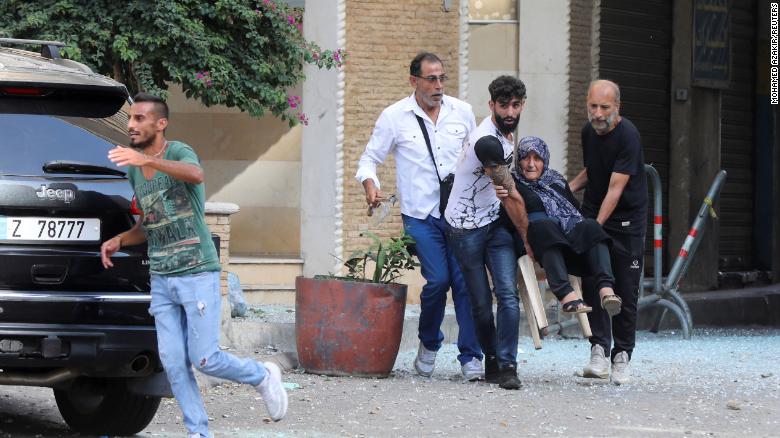
Men help evacuate an elderly woman after gunfire erupted, in Beirut, Lebanon October 14, 2021.
The probe into the port explosion that killed more than 200 people is at the heart of Thursday's tumult. The investigation -- the biggest ever legal challenge to Lebanon's ruling elite, who are also a holdover from the civil war -- is widely seen as a potential milestone, a tool through which the country can begin to shed its blood-drenched past.
Neither the masked gunmen who emerged from a Hezbollah-organized protest against the port probe, nor the unknown snipers who appeared to be posturing as defenders of the investigation, have a vested interest in Lebanon moving forward or finding answers from the devastation of August 2020. Hezbollah and its ally Amal have accused the Christian right-wing party and former militia, the Lebanese Forces (LF), of being behind the sniping -- an allegation the LF has rejected.
Thursday's fighters appear keen to keep the tiny Mediterranean country stuck in the past, just when the population has overwhelmingly voiced support for a better future. The judge leading the investigation into the probe, Tarek Bitar, has emerged as a champion of those people. Hezbollah, on the other hand, has positioned itself as Bitar's most vociferous opponent.
People of all religious stripes were casualties of the August 2020 explosion. Across Lebanon's religious spectrum, people want justice. In that same vein, Hezbollah — which has not been prosecuted in the probe so far — has led a political offensive on behalf of a multi-religious elite.
Bitar has sought to question top officials across the board, and has recently issued arrest warrants against three former ministers — a Sunni Muslim, a Shia Muslim and a Maronite Christian.
The divisions therefore do not play out along Lebanon's age-old confessional lines. Instead some say observers ought to be looking at the implications of the probe itself. The investigation into the Beirut blast has rattled the political elite in a way that the blast itself, one of the largest non-nuclear explosions in history, could not.
The ramifications of the probe could extend beyond Lebanon and to the Arab world at large. This is a region well-known for brazenly undermining its judiciary, even as the appetite for accountability among an increasingly frustrated Arab youth continues to grow.
If, against all odds, Bitar can see his investigation through, then he could be setting a precedent for the entire region. Arab leaders should take note.
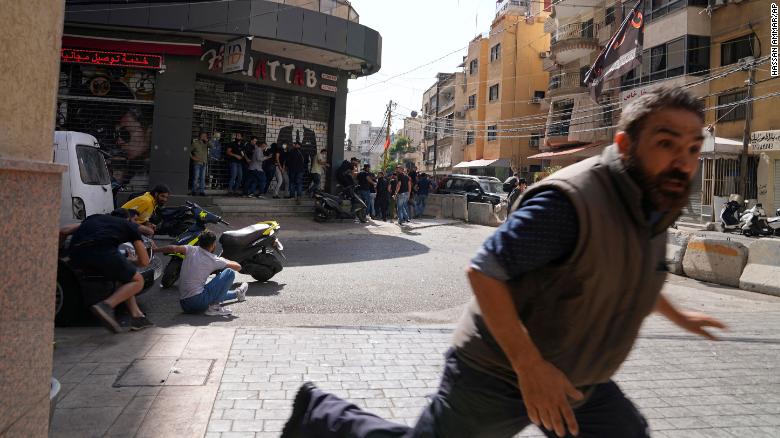
A man runs for cover as gunfire breaks out at a protest in Beirut, Lebanon, on Thursday, October 14.
